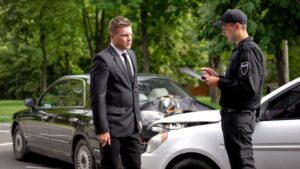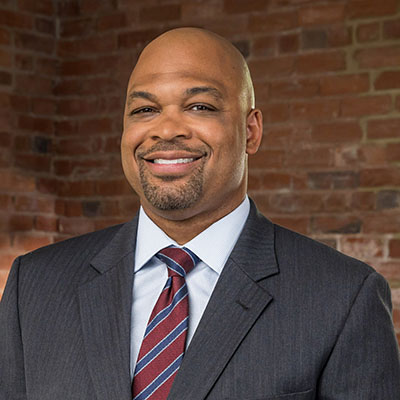The guy who hit me got a ticket. How does that affect my case?
When it comes to car crash cases, we get a lot of questions regarding the interplay between the criminal and civil sides of our legal system—especially as it pertains to traffic tickets.
One of the most common questions we get involves the difference between a criminal charge and court appearance versus a civil action. Clients often ask, “If the person who hit me got a ticket, doesn’t that mean that I win my case?” Below, I will address the differences between criminal and civil cases and how the criminal case can affect the civil case.

Criminal vs. civil cases
Our justice system is composed of criminal and civil cases. Each side is integral in its own way, but one often has little bearing on the other.
In the criminal justice system, the general purpose is to punish the wrong-doer’s past criminal conduct and hopefully deter him from committing any additional crimes in the future. The judge often levies fines or sends the perpetrator to jail or prison. The burden of proof in a criminal trial is “beyond a reasonable doubt.” This means that the prosecutor has the burden of proving the defendant’s guilt so thoroughly, that there can be no reasonable doubt that the defendant committed the crime as charged.
In contrast, the civil side is set up to compensate a person who has a wrong done to them. This results in a monetary award; jail is never the result of a civil trial. Unlike the strict guidelines set by criminal cases, the burden of proof for a civil trial is by a “preponderance of the evidence.” This means that the plaintiff must prove that the defendant is “more likely negligent than not,” or more than 50% negligent.
Because they are two different sides of our legal system, the outcome in one trial often does not affect the other. However, there are some specific ways that the criminal side can affect our civil cases.
What if the person who hit me got a ticket?
Our clients often wonder what effect a traffic ticket (or lack thereof) will have on their civil case. The answer is that a ticket, or lack thereof, doesn’t matter at all. A criminal trial may have an effect on the civil case, but a ticket alone has no effect because it cannot be used as evidence in a civil trial.
When a ticket is issued, it is the police officer’s opinion, based upon the officer’s investigation of the crash, about who caused the crash. However, receiving a traffic ticket is not the same as being found guilty of causing the crash. The traffic court judge makes the determination regarding guilt or innocence. In our legal system, you are presumed innocent until proven guilty. By allowing a ticket to be used as evidence in a civil court, it negates that principle and will likely create bias against the defendant.
Can the crash report come into evidence in a civil trial?
The short answer to this question is: No. Following a reportable crash (and each jurisdiction and officer may have different standards of what they consider “reportable”), the officer will write an FR300, also called a crash report. In it, they will note things such as:
- The identity of each driver involved in the crash
- Each driver’s address
- The identity of the person who owns each vehicle
- Insurance information for each vehicle
- The speed of both drivers before impact
- Whether either driver was under the influence of drugs or alcohol
- Road conditions
- A description of the crash
- A diagram of the crash
The crash report will also note if someone received a ticket. Sometimes there are things in the report that don’t meet our client’s best interests – perhaps they were speeding, or some other detail that puts them in a bad light. Still, the police crash report itself cannot be introduced as evidence in a civil proceeding.

Before you get too excited, though, the officer can testify to their memory of the event. They can describe what they observed and what the opposing party said. For example, if the defendant calls on the officer to testify, the officer could say that the plaintiff told them that they were traveling 50 mph in a 45-mph zone.
However, if that was just the officer’s conclusion, whether based on the damage or if another witness had given that number, the officer cannot state that in court. An officer is excluded from testifying as to what witnesses said on the scene under the rules of hearsay, even if they have it written down in their report.
The officer may bring their report up to the stand to refresh their memory, but they cannot read it word-for-word. This helps keep out opinion testimony. Although the officer can say, “both drivers claimed to have the green light,” they cannot say, “both drivers claimed to have the green light, but I concluded the defendant had a red.” Again, they also cannot testify as to what a witness claimed had happened, even if it would clear up who actually had the red light. The attorney would need to call that witness to testify themselves.
What happens in criminal court doesn’t always stay in criminal court
When a defendant pleads not guilty to a traffic infraction and the charge is dismissed, that information cannot come into play in a civil matter. One of the reasons behind this is the different burdens of proof, as described above. The criminal side has a much higher burden – beyond a reasonable doubt – as opposed to the civil requirement of 51%.
If a defendant is found not guilty at a criminal trial, they can still be found negligent in a civil trial under the preponderance of the evidence rule. Further, many courts allow plea agreements where charges can be dismissed in exchange for driving school and/or community service. By not considering the criminal court’s dismissal, the plaintiff has a better chance to argue that the defendant was at fault.
Similarly, a defendant who pleads not guilty but is found guilty cannot have that fact used against them in a civil trial. Again, this gets to the ultimate purpose of the judge or jury in a civil trial – to figure out who is negligent and caused the crash. If they were to only rely on a criminal judge’s findings, then it takes the decision out of their hands.

By this point, you’re probably asking, “So, can any part of a criminal case be presented in civil court?” Luckily, the answer is yes! Although an issued ticket cannot come into evidence in and of itself, sometimes the defendant’s actions can. If a defendant was charged with a traffic infraction that “arose out of the same occurrence upon which the civil action is based,” a plaintiff may introduce evidence.
This applies if the defendant:
- Plead guilty in the criminal case.
- Plead nolo contendere. This plea, also called an Alford plea, is when the defendant does not admit fault but does concede that the prosecution has enough evidence for a conviction.
- Was found guilty in absentia. This is when the defendant fails to appear in court and the judge convicts for non-appearance. This is allowed into evidence in civil cases under the premise the defendant admitted fault by not appearing in court.
These three exceptions are the only circumstances where a criminal outcome can apply in civil court.
What does this look like in real life?
Dastardly Dan runs a red light and crashes into Paula Plaintiff, who was proceeding through the intersection on a green light. The police arrive at the scene to hear Dan yelling that Paula ran the red light. Paula maintains she had the green light. An officer spoke to three witnesses who all said Paula had the green light. Dan gets a ticket for failure to yield. He misses his criminal trial date, and the judge convicts him in his absence (i.e. he is found guilty in absentia).
Paula sustained injuries as a result of the crash and brings a civil suit against Dan. Paula calls the officer to the stand. The officer may testify that Dan told him he had the green and that he was yelling at the scene. He can also testify that Dan was found guilty in absentia. However, the officer cannot testify that three witnesses said Paula had the green light or what Paula herself said.
Let’s change the facts for a second: Let’s say Dan got the ticket, but he went to driving school so his criminal charge was dismissed. In that case, the officer cannot state that he gave Dan a ticket or that the ticket was ultimately dismissed. He could still testify about the statements Dan made and his actions.
Does all of this sound confusing? Is your brain boiling and your eyes crossing? Don’t worry, the experienced Virginia personal injury attorneys at Allen & Allen know what they’re doing and how to apply these rules. If you or someone you know was injured in a crash through no fault of their own, they may be entitled to compensation. For a free and confidential case evaluation, please give us a call at 866-308-1307.



